To wait and to work; to do his duty, and leave the rest to God; to journey through life, gathering truth into his heart, and then into the family, the Church, the city; to be its faithful voice; this is the best use a man can make of his mortal days. And should it be your lot to be voices in the wilderness; among your children deaf to your cries; among your compatriots insensible to your warnings, console yourselves. Greater than you have suffered the same fate. Unite yourself in spirit to their company and be happy to suffer with them. At least as you come to understand more and more from day to day that truth can not perish, and that it is potent even on feeble lips; you will establish in your hearts faith in the world that endures, and you will be less astonished and less disconcerted when you see the face of this world pass away. You will live by the sacred fire cherished in your souls. Let your furrow close, your hope will not perish! Like Moses on Nebo, you will enter into the silence, having filled your dying eyes with the spectacle of the promised land!
GORDON
MAN IN THE IMAGE OF GOD
BIOGRAPHICAL NOTE
George Angier Gordon, Congregational divine, was born in Scotland, 1853. He was educated at Harvard, and has been minister of Old South Church, Boston, Massachusetts, since 1884. His pulpit style is conspicuous for its directness and forcefulness, and he is considered in a high sense the successor of Philip Brooks. He was lecturer in the Lowell Institute Course, 1900; Lyman Beecher Lecturer, Yale, 1901; university preacher to Harvard, 1886-1890; to Yale, 1888-1901; Harvard overseer. He is the author of “The Witness to Immortality” (1897), and many other works.
GORDON
Born in 1853
MAN IN THE IMAGE OF GOD[1]
[Footnote 1: Printed here by kind permission of Dr. Gordon.]
And God created man in his own image, in the image of God created he him.—Genesis i., 27.
It must never be forgotten that all truth lies in the order of life itself. There is a natural environment, and in it have been, real and mighty from the beginning, the laws and forces which science has but recently discovered. Copernicus discovered the true order of the solar system; but the order itself has been there from the morning of time. Newton discovered the force of gravity, but that force has been in the natural situation since creation. Chemists have been able to make out sixty-five or sixty-six irreducible elements; but while chemistry is young, the elements are everlasting. Electricity is the discovery of yesterday, and yet it has been at play in man’s environment from the foundation of the world. The continuity of life, from the lowest forms of it up to man, has been a fact from the first; but not until this century has the fact




